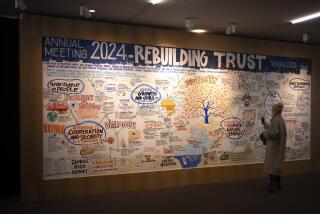NEWS ANALYSIS : Tough Task Ahead in Keeping Trade Promises : Summit: Turning a spirit of cooperation into actual economic progress will likely be an uphill fight for U.S. and Japan.
- Share via
PALM SPRINGS — Pledges by President Bush and Japanese Prime Minister Toshiki Kaifu to inject new momentum into resolving their countries’ trade frictions may dampen political tensions for a few months, but it remains to be seen whether they will herald a new era of U.S.-Japanese economic cooperation, government and private experts said Sunday.
To many analysts, Bush’s strategy at the so-called Palm Springs summit--actually held in nearby Rancho Mirage--seemed to be an imaginative enough stroke: The United States would try to coax Japan into taking more serious steps to open its markets by offering in return the “wider say” Tokyo is seeking in international affairs, commensurate with its heightened economic clout.
Both sides presumably would gain, and the two leaders would have prevented trade tensions from undermining their countries’ broader relationship.
“I’m very pleased with this summit--I like the feel of it afterwards,” Bush exulted at a closing press conference Sunday before leaving Palm Springs for Washington.
But the gambit also has involved some risks.
No matter how good their intentions, neither Kaifu nor Bush will be able to deliver very easily on the pledges to which they have now staked themselves politically.
Beyond the narrower trade spats over satellites, supercomputers, forest products and the like, the United States is asking Kaifu to take on powerful special-interest groups and alter the very structure of his nation’s business practices and consumer buying habits.
Similarly, Bush’s hope of transforming America from the free-spending, now mentality of the 1970s and ‘80s to a born-again, high-saving--and quality-oriented--international competitor is likely to be an uphill fight. Even cutting the budget deficit, so there will be more money available in the markets for private investment, is proving to be elusive.
Predictably, U.S. reaction to the California summit was mixed. In an appearance Sunday on NBC’s “Meet the Press,” House Majority Leader Richard A. Gephardt (D-Mo.), who has been one of Bush’s most vocal critics on trade issues, complained that the President did not go far enough to be very effective. He said Bush should have set specific goals for Japanese purchases of U.S. goods and then threatened to impose tariffs if those targets are not met.
“How many of these press conferences have we heard before?” Gephardt asked, referring to the joint appearance by the two leaders Saturday.
Nevertheless, Ed Lincoln, a Brookings Institution expert on Japan, said he thinks the Administration’s effort was deftly handled. “Sure, it’s something of a gamble, but the Administration will get more this way than they would with a (more threatening) stance,” Lincoln said. “Whether they’ll get enough to dampen the political frictions still is uncertain.”
The Administration’s major goal was to persuade the Japanese to move more aggressively to help ease trade tensions between the two countries. So far, Tokyo has refused to budge on U.S. complaints that it is unduly restricting imports on half a dozen individual products. And broader talks, designed to tackle more fundamental economic problems that may be contributing to the U.S.-Japanese trade imbalance, are faltering.
Congress already is in an uproar, and the Administration is facing a series of deadlines for deciding whether to retaliate by imposing trade sanctions on Japan. That, in turn, could trigger a backlash in Japan, where voters already are resentful of the growing threats; many Japanese believe America has brought its economic problems on itself.
The message Bush delivered to Kaifu was that his Administration, too, is anxious to move beyond the trade issue and build a broader “partnership” with Japan, but it will be hamstrung in that effort politically until the two sides can get their trade frictions ironed out.
With Japan’s governmental system so complex, it would take a concerted effort by Kaifu’s ruling Liberal Democratic Party to provide the political push needed to persuade voters--and Japan’s semi-independent ministries and bureaucrats--to begin opening the country’s markets.
“To take the political decisions from the top” is the way Bush phrased it during private sessions with Kaifu.
Bush’s offer to bring Japan in as a major player in important international economic and political decisions was not an idle one. For all their friction on trade issues, U.S. officials pointed out that the two countries share common views on many issues, from Soviet relations to drug interdiction, and could be a formidable force if they worked more closely together.
And cash-rich Japan already is stepping into the role that the United States played in the late 1940s. It is financing aid to Panama and Nicaragua and helping with Mexico’s debt-reduction plan and with the recovery in Eastern Europe.
More to Read
Inside the business of entertainment
The Wide Shot brings you news, analysis and insights on everything from streaming wars to production — and what it all means for the future.
You may occasionally receive promotional content from the Los Angeles Times.










